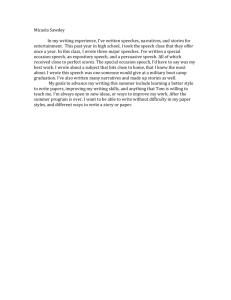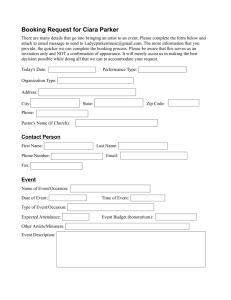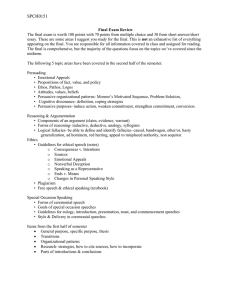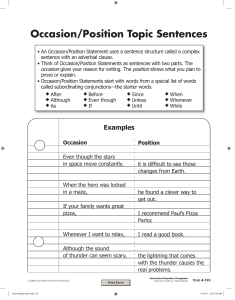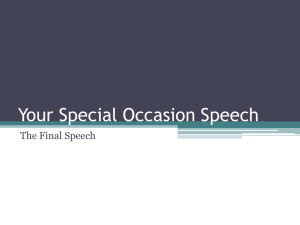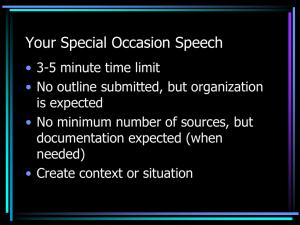Sp Cm 212 Fundamentals of Public Speaking Preparation Outline Lecture 13W
advertisement
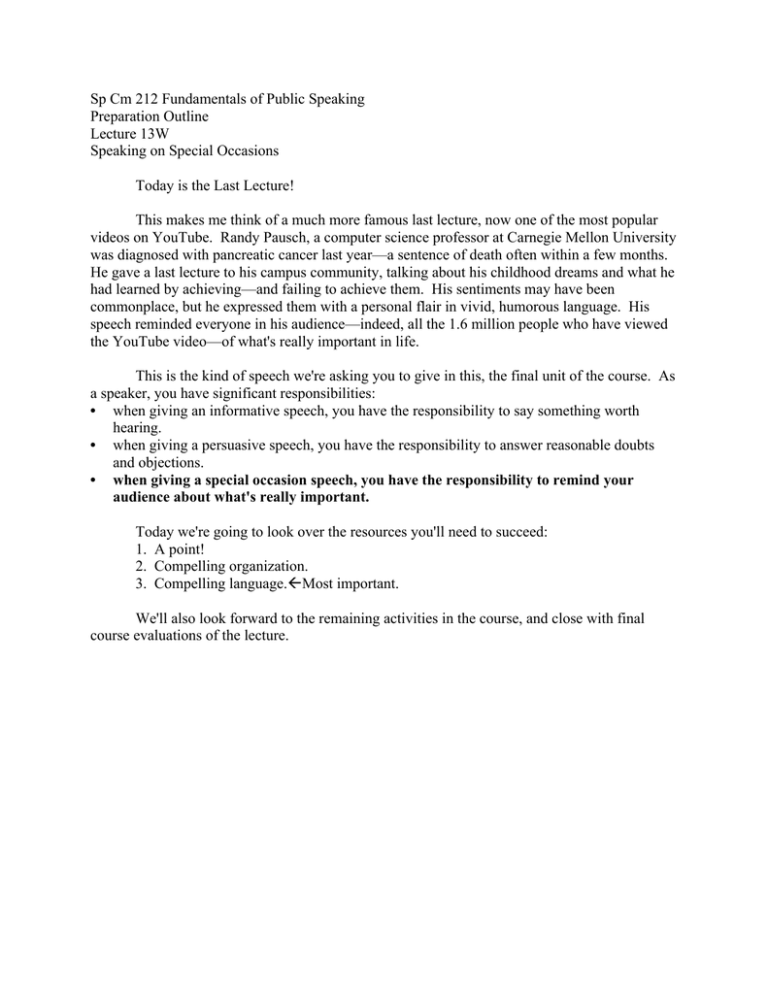
Sp Cm 212 Fundamentals of Public Speaking Preparation Outline Lecture 13W Speaking on Special Occasions Today is the Last Lecture! This makes me think of a much more famous last lecture, now one of the most popular videos on YouTube. Randy Pausch, a computer science professor at Carnegie Mellon University was diagnosed with pancreatic cancer last year—a sentence of death often within a few months. He gave a last lecture to his campus community, talking about his childhood dreams and what he had learned by achieving—and failing to achieve them. His sentiments may have been commonplace, but he expressed them with a personal flair in vivid, humorous language. His speech reminded everyone in his audience—indeed, all the 1.6 million people who have viewed the YouTube video—of what's really important in life. This is the kind of speech we're asking you to give in this, the final unit of the course. As a speaker, you have significant responsibilities: • when giving an informative speech, you have the responsibility to say something worth hearing. • when giving a persuasive speech, you have the responsibility to answer reasonable doubts and objections. • when giving a special occasion speech, you have the responsibility to remind your audience about what's really important. Today we're going to look over the resources you'll need to succeed: 1. A point! 2. Compelling organization. 3. Compelling language.Most important. We'll also look forward to the remaining activities in the course, and close with final course evaluations of the lecture. I. A great Special Occasion speech leaves the audience with something to think about—its Central Idea. A. Just as a reminder—as we've seen from the beginning of the course, all speeches need to have a point. 1. The overall aim of the speech is expressed in the General Purpose statement; the specific aim in the Specific Purpose statement; and the point you want the audience to take away at the end in the Central Idea. 2. For example, Randy Pausch's CI was something like: "In dreaming, trying, and failing to achieve our childhood dreams we learn the imagination, perseverence and sense of fun we need to succeed—and to help others succeed, too." B. Your Central Idea should express the basic values you want your audience to reflect upon. 1. A Special Occasion speech is meant to remind the audience of what is most important, and values are what is most important. a. Values are the things we care about. b. Values are visions of what we want to achieve in life. c. Values are what make us who we are. EXERCISE: example of values C. As a Special Occasion speaker, you are creating community. 1. Your audience begins as individuals, each thinking his or her own thoughts, paying attention to his or her own personal concerns. 2. By reminding your audience of the values you all share, by the end they should remember that they have a lot in common. 3. This is what needs to be done at events like weddings, ceremonies honoring individuals, graduations: people need to come together around the values they share. D. In sum, whether you are aiming to entertain or to inspire, you should have a Central Idea that expresses the basic values you want to remind your audience about. You should leave them thinking! II. A great Special Occasion speech has a compelling organization. A. Sound organization has been a main topic since the very beginning of this course. We've encountered a wide variety of concepts: about speech introductions, conclusions, paterns of organization, and connectives in between. B. It's likely that your speech will use topical organization, with one point for each basic value you'll be talking about. But one of the dangers of topical organization, however, is that it sounds like a grocery list. That's not going to be either entertaining or inspiring! C. Avoid this problem by considering what order you can put your points in to be most effective. How can you start with the smaller and more familiar matters, and end with a climax? Be sure to have a reason for why you put your first point first, and your last point last. III. A great Special Occasion speech uses compelling language. A. There are reasons why the language of a Special Occasion speech is, well, special—in a "higher" style. 1. Special Occasion speeches are given at important moments in people's lives: weddings, funerals, graduations, retirements. You'd dress up to go to these events—and you need to dress up your langauge, too. "Dressed up" langauge is a sign of respect for the occasion, the subject, and the audience. 2. You can also use stylistic devices to reinforce your organization—for example, using the same wording at the beginning and end of each section of your speech. 3. But most importantly, we're encouraging you to use "high style" in this speech because this is the kind of language which can help make values real. B. Language can make abstract values concrete and compelling. 1. Values are abstract, general, and things you can't see, hear, touch or experience. 2. But by the creative use of language, you can help your audience experience the values as concrete, specific, and tangible. 3. Consider for example the value "freedom." EXERCISE C. So remember: Use vivid language—the textbook gives you seven different techniques. 1. Three are techniques of Imagery: Concrete Words, Metaphor, and Simile. 2. Four are techniques of Rhythm: Alliteration, Repetitino, Parallelism, Antithesis. [Summary: the three key assessment standards for a Special Occasion speech: CI, organization, language.] IV. What's to come in the semester. A. Friday: experiments with language. B. Monday: impromptu speeches! C. Wednesday: Test 3 (see online)! D. All bonus work is due by the end of next week. E. There's an optional final exam, which replaces the quiz grades; see the online study guide & email me if you're coming. F. Outside speech evaluations. V. And then, one last thing for today: final course evaluations. A. I'm going to ask you to evaluate the parts of the class for which I'm directly responsible: the syllabus, the staff, the lectures, the quizzes, the tests. You'll have an opportunity to evaluate your lab instructor during dead week. B. The primary audience for your evaluations is me. I do read them, and you can influence my behavior. Remember the basic principles we've been following, about how to give feedback: focus on what's most important, be specific & detailed, give advice, and take responsibility for what you say. C. The assessment standard I'm most interested in is how much, if at all, has this course helped you achieve our overall goal. 1. Our overall goal has been to prepare you so that in 10 years, you will be giving great speeches and presentations. 2. I hope you know the substantial gains you have made: a. Now you know from experience that you can get up in front of others and speak. b. Now you know from experience some techniques for how to do this. c. Now you know from experience why its important to be able to influence others—to be a person of significance, one whose voice is heard. d. Now you know from experience that it can be fun! Good luck!

